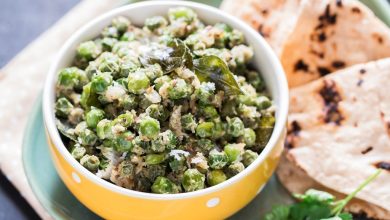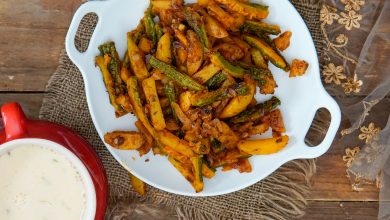Uttar Pradesh Style Arbi Jhol with Lotus Seeds (Colocasia Sabzi)
Arbi Jhol Recipe – Uttar Pradesh Style Colocasia & Lotus Seeds Sabzi
Arbi Jhol, a delightful dish from Uttar Pradesh, combines the earthy flavors of colocasia roots (arbi) with the crunchy texture of lotus seeds (phool makhana). This flavorful, vegetarian side dish offers a savory, mildly spiced experience that perfectly complements a variety of Indian flatbreads, rice, or dal. Rich in taste and packed with nutrition, this dish makes for a hearty, satisfying addition to any meal.
Ingredients:
| Ingredient | Quantity |
|---|---|
| Colocasia roots (Arbi) | 10, chopped into discs |
| Lotus Seeds (Phool Makhana) | 15, roasted |
| Tomatoes | 2, chopped |
| Green Chillies | 2, chopped |
| Fresh Ginger | 1 inch, grated |
| Sunflower Oil | For cooking |
| Cumin Seeds (Jeera) | 1 teaspoon |
| Asafoetida (Hing) | A pinch |
| Red Chilli Powder | 1 teaspoon |
| Coriander Powder (Dhania) | 1 teaspoon |
| Cumin Powder (Jeera) | 1/4 teaspoon |
| Turmeric Powder (Haldi) | 1/2 teaspoon |
| Garam Masala Powder | 1/2 teaspoon |
| Kasuri Methi (Dried Fenugreek Leaves) | 1/2 teaspoon |
| Salt | To taste |
| Fresh Coriander (Dhania) Leaves | For garnish, chopped |
Preparation Time: 10 minutes
Cooking Time: 20 minutes
Total Time: 30 minutes
Servings: 4
Cuisine: Uttar Pradesh
Course: Side Dish
Diet: Vegetarian
Instructions:
-
Prepare the Colocasia (Arbi):
Begin by washing, peeling, and slicing the colocasia roots (arbi) into discs of uniform thickness. This ensures even cooking. -
Fry the Arbi:
Heat a shallow frying pan and add a little oil. Fry the arbi discs until they are slightly crispy and golden on the outside. Set them aside once done. -
Roast the Lotus Seeds:
In the same pan, roast the lotus seeds (phool makhana) until they become crispy. Set them aside along with the fried colocasia. -
Make the Tomato Paste:
In a mixer, grind the tomatoes, green chillies, and grated ginger together into a smooth paste. Set the paste aside in a bowl. -
Cook the Base:
Heat some oil or ghee in a kadai (wok). Once hot, add the cumin seeds (jeera) and let them sizzle. Add a pinch of asafoetida (hing) to the oil. When the aroma of hing releases, add the prepared tomato paste. -
Sauté the Tomato Mixture:
Add salt to taste and sauté the mixture until the tomatoes start cooking down, thickening, and blending well with the other ingredients. This should take a few minutes. -
Simmer the Colocasia:
Once the tomato base is ready, add the shallow-fried arbi pieces to the pan. Add about one cup of water and mix everything well. Cover the pan with a lid and simmer for about 5-6 minutes, allowing the flavors to meld. -
Add Lotus Seeds:
When the arbi is almost cooked through, add the roasted lotus seeds to the dish. Allow everything to simmer for another 2-3 minutes, so the flavors are absorbed by both the arbi and the lotus seeds. -
Final Touches:
Stir in the garam masala and crushed kasuri methi. Give everything one last good mix, then turn off the heat. -
Garnish and Serve:
Garnish your Arbi Jhol with freshly chopped coriander leaves for an extra burst of freshness and flavor.
Serving Suggestions:
Arbi Jhol can be served with a variety of accompaniments to make for a complete meal. Pair it with Pudina Tawa Paratha (mint-flavored flatbread), Baingan Ka Chokha (mashed spiced eggplant), Steamed Rice, and a bowl of Dal Tadka flavored with lemon and coriander. This combination will provide a balanced and flavorful meal that is sure to please.
Tips:
- To enhance the texture and flavor of this dish, ensure that the lotus seeds are roasted to a crispy perfection before adding them to the curry.
- If you prefer a spicier version of Arbi Jhol, you can increase the amount of green chillies and red chilli powder to suit your taste.
- You can add a dash of lemon juice just before serving for a subtle tanginess that will brighten the flavors of the dish.
This Arbi Jhol is a wonderful way to incorporate more vegetables into your diet while enjoying the delicious flavors of Uttar Pradesh. It’s easy to make, wholesome, and a perfect vegetarian dish to serve with a variety of traditional Indian breads and rice. Enjoy!








